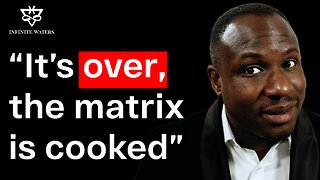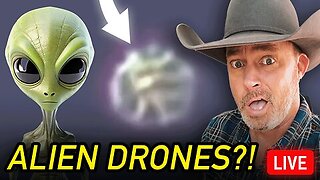Premium Only Content
![( -0578 ) January 6 - Was Pelosi "Waiting For This"? [see 02:00] )](https://1a-1791.com/video/s8/1/e/f/M/R/efMRm.qR4e-small-January-6-Like-Pearl-Harbor.jpg)
( -0578 ) January 6 - Was Pelosi "Waiting For This"? [see 02:00] )
J6 - Like Pearl Harbor - Pelosi Says She's Been Waiting For This , Whatever That Means (Time stamp 02:00).
Foreknowledge of Pearl Harbor may or may not have been a thing, History Channel will have you doubt it and finish their documentary confused. On the other hand, it's odd that the ships and planes were conveniently in the harbor and on the tarmac. Would you put it past people in positions of trust to fail to do their jobs as entrusted? I wouldn't. In fact even when very young that seemed possible. Questioning something can arouse anger, but that's not the intent here. The intent is to review some footage & opinions.
Compelling footage from throughout the day plus interview segments with Tucker and Steven Sund.
Pearl Harbor Foreknowledge has been examined in several books, and now FOIA requests have revealed much more:
"
If what you’re saying is true, then Pearl Harbor is a prime example of government treating human beings like guinea pigs. Yet, you, yourself, don’t disparage and don’t have a negative view of FDR.
Stinnett: No, I don’t have a negative view. I think it was his only option to do this. And I quote the chief cryptographer for the Pacific fleet, who said, “It was a pretty cheap price to pay for unifying the country.”
That cryptographer, Commander Joseph Rochefort, was a confidant of McCollum’s. He worked closely with Kimmel in Pearl Harbor. It could be argued that Rochefort was the closest one to Kimmel who was most responsible for denying Kimmel of the vital intelligence. And he did make that statement. But do you agree with that? A lot of people would be offended and angered by that statement. A lot of people wouldn’t agree with it.
Stinnett: A lot of people would not, but I think under the cirumstances this was FDR’s only option. And, of course, this was sort of used in the Viet Nam War, you know. The Gulf of Tonkin Resolution was based on a provocation aimed at the North Vietnamese gunboats—something like that. That’s how President Johnson got The Gulf of Tonkin Resolution passed through the Congress. There was a provocation.
Apparently, it’s a military strategy, but the families—obviously—of the people who get killed when a military uses this strategy wouldn’t agree with it.
Stinnett: Oh, right. I know. Oh, when I speak about this with the families they just start crying about it, you know. They’re terribly upset....But, you know, it was used by President Polk in the Mexican War in 1846. And also by President Lincoln at Fort Sumter And then also, as I say, another example is Viet Nam, this Gulf of Tonkin business.
It could be a traditional military philosophy, the idea that a military has to sometimes provoke the enemy to attack, sacrifice its own soldiers, so as to unify a country for war.
Stinnett: I think so. I think you could probably trace it back to Caesar’s time.
"How much in your book has never been revealed to the public before?
Stinnett: The breaking of radio silence. The fact that the Japanese ships did not keep silent as they approached Hawaii....The breaking of Japanese codes—I mean the full proof of it. Military codes, I want to emphasize that....And also McCollum’s eight action memo—that’s the whole heart of my book. If I didn’t have that it wouldn’t be as important. That is the smoking gun of Pearl Harbor. It really is."
-
 13:12
13:12
Melonie Mac
19 hours agoAspyr Teases Possible New Tomb Raider Games in Classic Remastered Style
3.65K4 -
 44:49
44:49
Chrissy Clark
13 hours agoThe Rise Of Female Shooters, ABC News’ $16M Settlement, & MORE I Underreported Stories
2.46K2 -
 2:49:13
2:49:13
InfiniteWaters(DivingDeep)
21 hours agoIt's Over - The Matrix Is Cooked | Infinite Waters
2.29K1 -
 15:49
15:49
Chris From The 740
1 day ago $0.02 earnedThe EAA Girsan Influencer X - Not Your Grandpa's 1911
1.67K3 -
 25:38
25:38
Producer Michael
15 hours agoLuxury Souq's MULTI-MILLION DOLLAR Watch Collection!
68K5 -
 17:06
17:06
Sleep is CANCELED
20 hours ago10 SCARY Videos To Keep You Up All Night!
44.7K2 -
 2:37
2:37
Canadian Crooner
1 year agoPat Coolen | Let It Snow!
27.6K9 -
 2:44
2:44
BIG NEM
11 hours agoWhat's Really Behind the Fake Alpha Male Epidemic?
23.5K4 -
 57:20
57:20
State of the Second Podcast
7 days agoThe Inventor of Bump Stock Fights Back! (ft. Slide Fire)
15.9K5 -
 1:04:12
1:04:12
PMG
1 day ago $11.69 earned"I’ll be DRONED for Christmas!"
58.9K12